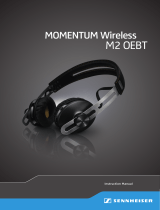
Important safety information
2 | SD Series – Setup Guide
Important safety information
왘 Please read this instruction manual carefully and completely before
using the product.
왘 Always include this instruction manual when passing the product on to
third
parties.
왘 Do not use an obviously defective product.
Pr
eventing damage to health an
d accidents
왘 Do not listen at high volume levels for long periods of time to prevent
hearing damage.
왘 Always
maintain a distance of at least 3.94” (10 cm) between the ear
cups
and the cardiac pacemaker or implanted defibrillator since the
product generates permanent magnetic fields.
왘 Keep the product, accessories and pac
ka
ging parts out of reach of chil-
dren and pets to prevent accidents and choking hazards.
왘 Do not use the product in situations which require special attention.
Preventing damage to the product and malfunctions
왘 Always keep the product dry and do not expose it to
extreme tempera-
tures (hairdryer, heater, extended exposure to sunlight, etc.) to avoid
corrosion or deformation.
왘 Only use attachments/accessories supplied or recommended by
Sen
nheiser.
왘 On
ly clean the product with a soft, dry cloth.
왘 Unplug the power supply unit from the wa
ll socket
to completely
disconnect the product from the mains power supply.
왘 Do not short-circuit the contacts of the
product. Make sure that no
metal objects (e.g. paper clips, hair pins, earrings) come into contact
with the interfaces and contacts.
왘 Only use the base station for charging SD series headsets.
Intended use/Liability
The headset system can be used for calli
ng and – together with a computer
(VoIP) and/or a telephone – for audio input/output and is intended for
professional office or call center use.
It is considered improper use when this product is used for any application
not named in this instruction manual.
Sennheiser does not accept liability for damage arising from abuse or
misuse of this product and its attachments/accessories. The risk is to be
borne by the user.
Sennheiser is not liable for damages to USB devices that are not consistent
with the USB specifications.
Sennheiser is not liable for damages resulting from the loss of connection
due to flat or overaged rechargeable batteries or exceeding the DECT
transmission range.
The US base stations operate on special transmission frequencies whose
use is not authorized outside the United States.
왘 Do not use the SD BS US base station outside the United States.





















